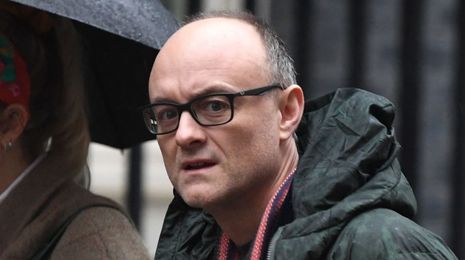A Sociological Perspective on the Cummings Controversy: We’re all in this together
Shemaya Hurd-Thomas uses psychology and social norm research to evaluate the likely outcomes of Cummings’ recent actions.

A few weeks ago, the news broke that top government aide Dominic Cummings had travelled the 260 miles from London to county Durham in search of childcare when the UK was in full lockdown. The headlines of newspapers across the political spectrum spent the following days reflecting in shock at his behaviour, something exacerbated by Boris Johnson’s full support of his aide and desire for the country to “move on” from Cummings’ actions. Whatever your political standing, or views on the appropriateness of Cummings’ actions, social norms research suggests that they are bad news for the norms surrounding lockdown and social distancing that the government has worked hard to implement in the past months.
Social norms are standards of behaviour that are based on widely shared beliefs around how individuals are supposed to behave in a given situation. They can be further split into descriptive norms, which highlight how common a certain behaviour is, and prescriptive norms, which highlight how common approval or disapproval of that behaviour is. Norms are critical to large scale human cooperation, helping to promote group cohesion. They can have a large impact on human behaviour, and actions that lead to changes in the perception of what is normative can lead to large changes in people’s behaviour.
“Less than half of Britons now trust the government to provide accurate information about the pandemic.”
People’s perceptions of social norms are often inaccurate, and the actions of prominent individuals, or social referents, can have a large impact on these perceptions, despite not necessarily changing the prevalence of the behaviour itself. In social norms research, a social referent is an individual who is psychologically salient; their behaviours are noticed more than others in the group because of their connections within that group. Cummings is an individual who is well known across the social network of the UK, being the government’s chief political advisor, so any deviation in his behaviour from lockdown norms is likely to affect the behaviour of a wide range of others. This influence is partially because his actions are likely to be widely publicised, as highlighted in the news storm that followed the discovery of his actions. Research shows that if individuals know that new normative information is widely shared among group members, then they are likely to pay particular attention to that information when deciding which behaviours are socially appropriate.
When a norm contradicts people’s personal opinions and desires, as many of the norms surrounding lockdown and social distancing do, people have to be motivated to comply with them. This task is hard and is likely to only work when a norm is perceived to be so strong that deviation from it will lead to social punishment. Here, institutional signals from the government can be critical in conveying normative information and enforcing norms, being able to highlight the behaviours that are common or desirable in a group. Institutions also have the power to implement punishments, such as fines, for those who do not comply. These interventions are significant, with behavioural economics research highlighting that sanctions are necessary for high levels of cooperation to be maintained. The consequences of a lack of punishment can be seen in the aftermath of Cummings’ actions, with the government’s condoning of his behaviour leading to public perceptions that there will be issues with compliance to future lockdown messaging.
Research into effective leadership shows how Cummings’ actions may damage the efficacy of the government’s response to coronavirus going forward. People often prefer leaders who cultivate a sense of ‘we are all in this together’, something which Cummings’ actions are perceived to have undermined. Those leaders who are viewed as being unwilling to share the hardships of their citizens are less likely to be able to influence the behaviour of those citizens.
“While Cummings’ actions may not suggest it, social norms will ensure that we are all in this together.”
Trust is an especially important factor in leadership, particularly during pandemics. For example, trust in the government has been correlated with decisions to abide by mandated social distancing policies and the use of clinics for care during the Ebola outbreak in Liberia. Trust in the UK government has dropped dramatically since the Cummings’ incident, with a Guardian article drawing on evidence from a YouGov survey to highlight that less than half of Britons now trust the government to provide accurate information about the pandemic. This finding is highly problematic and may lead to a lack of respect for further government guidelines surrounding coronavirus. It may also create a perceived gap in information provision, leaving individuals more vulnerable to conspiracy theories surrounding coronavirus than they were before.
Leaders can act as important role models, with their own prosocial and selfless acts serving to elevate this behaviour in others. In ‘leading by example’, they can be interpreted as reflecting the norms of the group and can highlight the importance of certain behaviours. The failure of Cummings and Johnson to do this may have unforeseen, detrimental consequences to the assertiveness of government coronavirus policies going forwards, potentially impacting the efficacy of the UK’s response to the pandemic.
Social norms research highlights that Cummings’ actions cannot simply be ignored, as Boris Johnson’s failure to penalise him might imply. The prominence of Cummings’ breach of lockdown measures, paired with the lack of punishment that he has received, are likely to affect people’s perceptions of lockdown norms, making them more inclined to believe that breaking coronavirus guidelines is socially acceptable. While Cummings’ actions may not suggest it, social norms will ensure that we are all in this together. This unfortunate consequence has already been noted, with police in North Wales stating that the public now believe that they can “do whatever they like”, something that has made policing inherently more difficult.
 News / Uni Scout and Guide Club affirms trans inclusion 12 December 2025
News / Uni Scout and Guide Club affirms trans inclusion 12 December 2025 News / Pembroke to convert listed office building into accom9 December 2025
News / Pembroke to convert listed office building into accom9 December 2025 Features / Searching for community in queer Cambridge10 December 2025
Features / Searching for community in queer Cambridge10 December 2025 News / Uni redundancy consultation ‘falls short of legal duties’, unions say6 December 2025
News / Uni redundancy consultation ‘falls short of legal duties’, unions say6 December 2025 News / Gov declares £31m bus investment for Cambridge8 December 2025
News / Gov declares £31m bus investment for Cambridge8 December 2025









